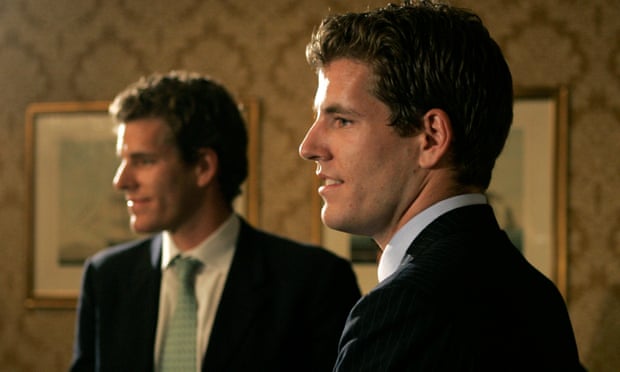Coders, cocktails and a bank heist in reverse – the brothers who sued Mark Zuckerberg and hit bitcoin boom time

If you have seen The Social Network, you will remember the Winklevoss twins: tall, preppy Harvard students (both played by Armie Hammer) who also happened to be Olympic oarsmen and who ended up suing Mark Zuckerberg for allegedly stealing their idea to make Facebook. (Zuckerberg eventually settled for $65m.) In that film they were portrayed as faintly ridiculous comic relief, personifying the establishment against which the geeks triumphed. No doubt, then, they were eager to be interviewed for this book, in which they are the heroes.
Ben Mezrich wrote the non-fiction account on which The Social Network was based, The Accidental Billionaires, and since it seems that the word “billionaires” works well in a book title, he is back to tell the story of how the Winklevi – as they are commonly known, though for some reason he insists here on spelling it Winklevii – made an early big bet on bitcoin, the digital cryptocurrency, and won big.
So far that doesn’t seem like much of a story – wealthy speculators speculate and accumulate – but what Mezrich does with it is more interesting than that. It ends up being a kind of anthropology of the bitcoin craze. On one side there are the libertarian anarchists who hate government and despise its “fiat money”, and also think people ought to be free to buy drugs on dark-web supermarkets such as Silk Road, which ran entirely on bitcoin until it was shut down. (The twentysomething geek who controlled the site was eventually sentenced to two life sentences plus 40 years, with no possibility of parole.) On the other side there are – well, the Winklevi, who think bitcoin ought to be respectable and integrated into the regulated banking system.
The problem that Tyler and Cameron Winklevoss face at the beginning of the book is that they are looking for somewhere to invest their Facebook settlement money, but no one in Silicon Valley wants to take their cash: Zuckerberg still hates them, and most startups dream of being acquired by Facebook, so it’s not worth the risk to deal with the twins. In New York, however, they meet a guy called Charlie Shrem, who runs an outfit called BitInstant, which enables people to buy bitcoin easily. They invest in his company and begin buying bitcoin. Shrem starts to enjoy the nightclubs-and-cocktails life a little too well, but the Winklevi know when to keep business and pleasure separate. When they first invest, bitcoin is trading at $120 per coin; in 2017 it hits $10,000 per coin and makes them billionaires. (At the time of writing, however, the notoriously volatile currency is back at $7,000 or so.) The win is all the sweeter because Zuckerberg never saw it coming.
The book is written with a slick beauty. It is structured as a sequence of dramatic scenes that often begin with movie-style datelines (“San Francisco. October 1, 2013”), and careful attention is paid to outfits: Tyler “was decked out in a crisp, white linen shirt, a brightly colored Vilebrequin swimsuit, and a woven straw fedora”. There is an especially brilliant and cinematic chapter about “a bank heist in reverse”, which details how the Winklevi split their private key (the long alphanumeric code that represented their bitcoin holdings) into three parts and stashed printouts in various safe deposit boxes all over the US, having erased all digital copies. The book even has a truly heartwarming ending, at which the reader gives a little cheer. As an introduction to the rise of cryptocurrencies and the modern tech world generally, it is as painless and novelistic as could be imagined.
The problem with bitcoin is that, by design, validating transactions and “mining” new currency use enormous amounts of energy pumped into supercomputing centres to solve very difficult but totally meaningless maths problems. Currently the maintenance of bitcoin worldwide has a bigger carbon footprint than the whole of Switzerland. As presently constituted, it thus has a hard thermodynamic limit to its usefulness, as well as being a significant contributor to global warming.
And who knows what might be discovered if the bitcoin network – the most powerful computing cluster the world has ever seen – were instead devoted to solving problems in physics or protein biology? To successful gamblers, bitcoin has been a gravy train; to many others, it is looking more and more like a spectacular misallocation of global resources.
• Bitcoin Billionaires is published by Little, Brown (£20). To order a copy go to guardianbookshop.com. Free UK p&p on all online orders over £15. or call 0330 333 6846.
Five years of Boris…
… and Brexit on the way. With a new Conservative government led by Boris Johnson poised for office, the Guardian’s independent, measured, authoritative reporting has never been so vital. These are turbulent, decade-defining times. Whatever lies ahead for us all, the Guardian will be with you – investigating, disentangling and interrogating. So our readers can make up their minds based on fact, not fiction.
More people, like you, are reading and supporting the Guardian’s independent, investigative journalism than ever before. And unlike many news organisations, we made the choice to keep our reporting open for all, regardless of where they live or what they can afford to pay.
The Guardian will engage with the most critical issues of our time – from the escalating climate catastrophe to widespread inequality to the influence of big tech on our lives. At a time when factual information is a necessity, we believe that each of us, around the world, deserves access to accurate reporting with integrity at its heart.
Our editorial independence means we set our own agenda and voice our own opinions. Guardian journalism is free from commercial and political bias and not influenced by billionaire owners or shareholders. This means we can give a voice to those less heard, explore where others turn away, and rigorously challenge those in power.
We hope you will consider supporting us today. We need your support to keep delivering quality journalism that’s open and independent. Every reader contribution, however big or small, is so valuable.

